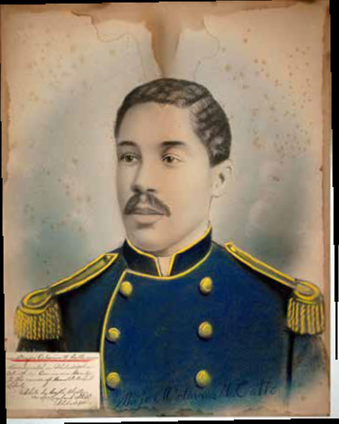An edited reprint of a prior Things Have Changed post
I've spent some time exploring the early history of professional baseball in America (I wrote about
the origins of the pre-professional game in Madame Blatavsky and the Birth of Baseball). The still-amateur game exploded in popularity in the Northeast and
Midwest in the years after the Civil War with clubs being established in
many cities and towns. Coming across a discussion of the
Pythian Base Ball Club of Philadelphia, a black ball team led by
Octavius Catto, which mentioned that Catto died at the age of 32 in
1871 piqued my curiosity and
I found a biography had been published at the website of the Society for American
Baseball Research (SABR) Bioproject, which revealed Catto
had been a significant public figure, known for much more than his baseball
career. More recently I've been making my way through a very long and
very detailed biography of Catto, which exhaustively investigates his
family background and race relations in Philadelphia, "Tasting Freedom: Octavius Catto and the Battle for Equality in Civil War America".
Catto's life and death are a reminder that while the white post-war
South may have instituted legal (de jure) discrimination, and
introduced a reign of terror to control the newly freed people, the
de facto discrimination in Northern states also proved effective in
resisting attempts at assimilation by blacks, sometimes with deadly
consequences.

(Right, Catto from SABR Bioproject)
Catto
was born in Charleston, South Carolina; his mother a free black woman
and his father, born a slave but later freed by his master and becoming a
Presbyterian minister. In 1848 Reverend Catto moved his family to Philadelphia,
the northern city with the largest black population, and during
the 1850s young Octavius attended the Institute for Colored Youth
(ICY), the city's only high school for blacks, where he was class
valedictorian. In 1859 he was hired as a teacher at ICY in English,
mathematics, Latin, and Greek.
During the Civil War, Catto
actively led recruitment drives that raised several regiments of U.S.
Colored Troops for the Union. With the end of the war he plunged into
a leadership role, campaigning for passage of the 13th, 14th and 15th
amendments, as well as undertaking direct actions, such as a campaign to
allow blacks to ride on Philadelphia streetcars, which ultimately, with
the help of his wife, succeeded. The SABR biography provides a concise account of his impressive efforts to obtain full civil rights for the black community.
Even
in baseball he was a pioneer, co-founding the Pythians in 1866 and
becoming the team's star infielder. According to the SABR biography:
". . . many of the players belonged to the Knights of Pythias Lodge, and thus
they became the Pythians (derived from a mythical priestess at the Greek
Temple of Apollo). Besides Catto, the Pythian leadership included other
prominent blacks who emerged from Underground Railroad families. Club
president James W. Purnell worked with abolitionists John Brown and
Martin Delany, and vice president Raymond W. Burr was descended from
American revolutionary Aaron Burr and was the son of a prominent black
activist."
Catto saw baseball as promoting black self-improvement and an opportunity to press for integration.
In 1869 the Pythians played the first documented game between black and
white teams, but while continuing to play such contests, the Pythian application to join the
National Association of Base Ball Players was voted down. Though, for a few years, black
ball players were to occasionally play in the professional leagues, a
firm color line was established by the late 1880s which remained in
place until 1947 when Jackie Robinson joined the Brooklyn Dodgers.(1)
Catto led another campaign
to get black voters to the polls in the Philadelphia mayoral election in
1871, despite white intimidation; the night before the election, two
blacks were beaten and shot (one fatally), by whites. The next day,
Catto purchased a six-shot revolver and was on his way home to get the
ammunition he had purchased when confronted by two white men who had
been searching for him. One of the men, Frank Kelly, pulled a revolver
and shot Catto three times, killing him. Kelly was eventually tried for
murder, but despite the testimony of six eyewitnesses (three white and
three black), all of whom stated the unprovoked Kelly shot Catto, he was acquitted by
the all-white jury.
W.E.B. DuBois later wrote of Catto,
"And so closed the career of a man of splendid equipment, rare force of
character, whose life was so interwoven with all that was good about us,
as to make it stand out in bold relief, as a pattern for those who have
followed after.”
According to the SABR biography:
Even whites were outraged at Catto’s murder in his quest for civil
rights. His funeral procession was the largest since Lincoln’s
assassination and unprecedented for a black man. Over the three-mile
route, tens of thousands of black and white Philadelphians watched in
reverence for a fallen hero, as more than 125 carriages paraded by,
containing Congressmen, military leaders, local politicians, students,
colleagues, soldiers, ballplayers, and fellow civil rights activists.
Memory of Octavius Catto
and his legacy faded over the years.
Over the past twenty years, he has received renewed recognition for his
pioneering efforts. In 2017, a 12-foot bronze statue of Catto was
dedicated and erected in front of Philadelphia City Hall.
------------------------------------------------------------
(1) The integration of Major League Baseball in April 1947, at a time when baseball was the most popular sport in America, was one of two significant events signaling a change in attitudes towards blacks in the late 1940s. The other event was President Truman's July 1948 Executive Order mandating the desegregation of the military services. For eight decades after the Civil War, white America resisted efforts by black Americans to assimilate into the life of this country, even while we were successfully assimilating millions of immigrants. These two actions were turning points for America.



 (Bari, Italy)
(Bari, Italy)